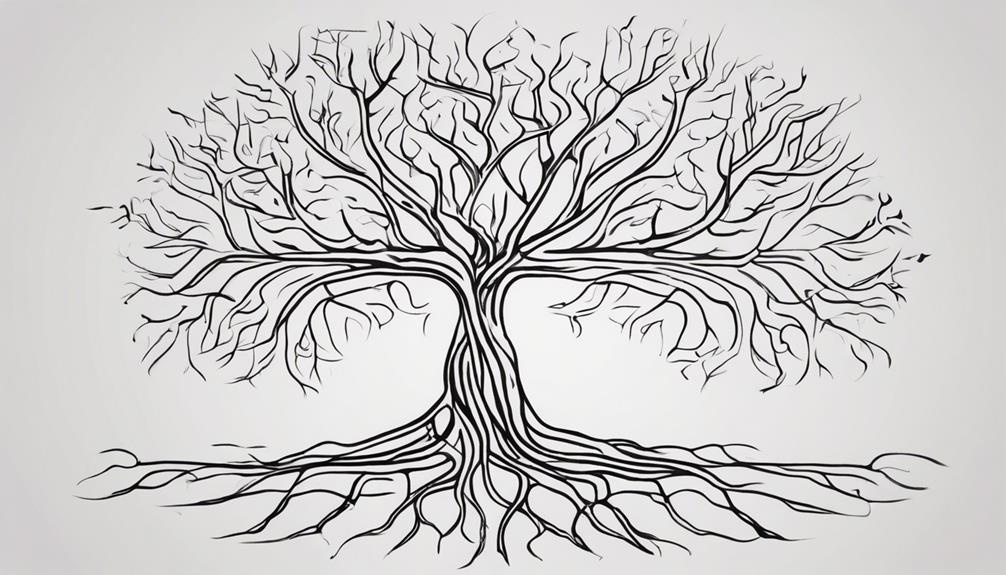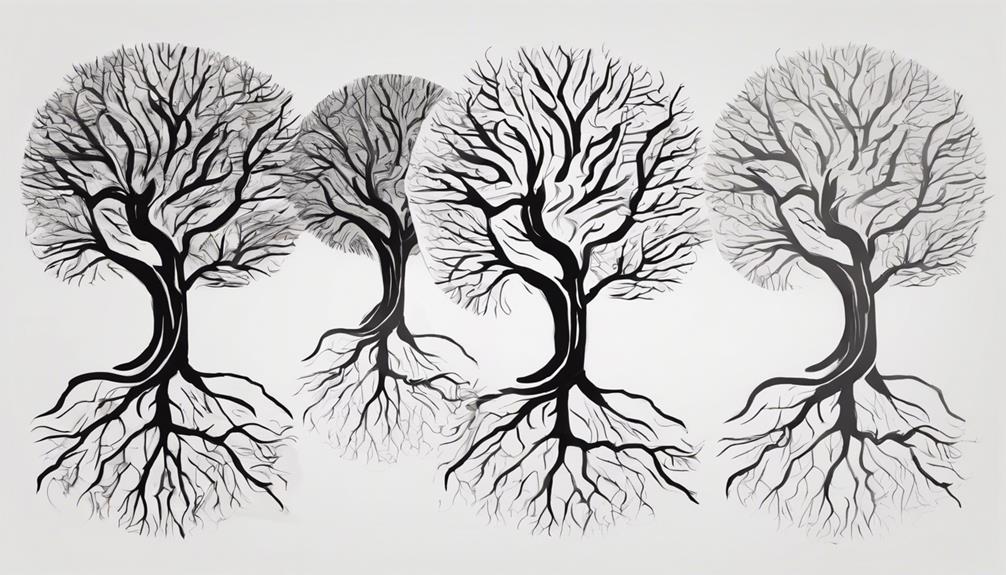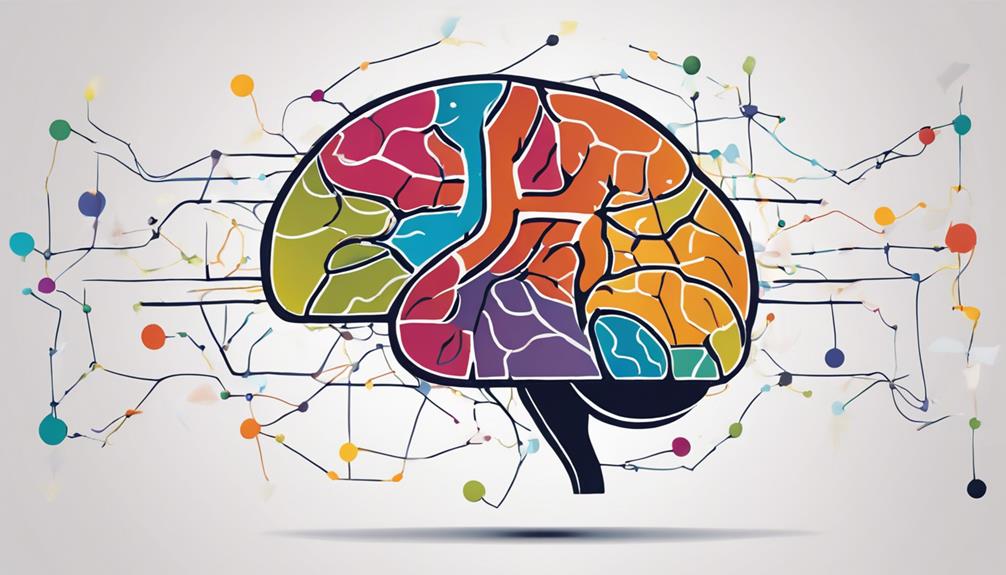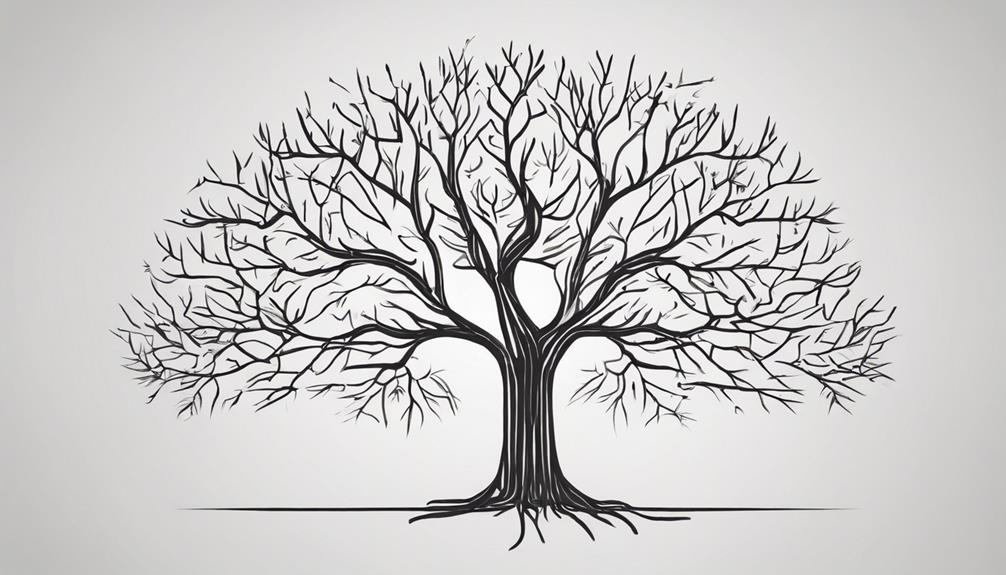Personality development is a multifaceted concept that has intrigued scholars and researchers for decades. While there is a consensus that both genetic predispositions and environmental influences play crucial roles in shaping who we are, the specifics of how this intricate process unfolds remain a subject of ongoing debate and investigation. As we navigate through the complexities of understanding our own personalities, it becomes imperative to critically assess the various theories that attempt to explain the development of our unique traits and characteristics. By examining these theories and their implications, we may gain valuable insights into the enigmatic intricacies of our personalities.
Key Takeaways
- Personality development is influenced by genetics, environment, social interactions, and early experiences.
- Social relationships play a crucial role in shaping and nurturing one's personality.
- Personal growth can be achieved through setting goals, facing fears, and building self-esteem.
- Positive social interactions are essential for boosting confidence and fostering healthy personality development.
Understanding Personality Development Theories

In the realm of psychology, the exploration of personality development theories serves as a critical foundation for understanding the intricate processes that shape individuals' behavioral patterns and characteristics. Personality theories, such as Freud's psychosexual stages, Erikson's psychosocial stages, Piaget's cognitive stages, and Kohlberg's moral stages, provide frameworks through which we can comprehend how individuals evolve over time. These theories offer valuable insights into the various factors that contribute to the development of personality, including social relationships, environmental influences, family dynamics, and cultural contexts.
One key aspect of personality development theories is their emphasis on the role of social relationships in shaping an individual's character. Erikson, for instance, highlighted the significance of interpersonal interactions in each stage of his psychosocial development theory. Understanding how individuals navigate and form relationships with others can provide significant clues about their personality development trajectory. By delving into these theories, researchers and practitioners gain a deeper appreciation for the complexities involved in the maturation of personality traits and behaviors.
Freud's Influence on Personality Development
Freud's enduring impact on personality development arises from his pioneering psychoanalytic theory, which underscores the profound influence of unconscious processes on shaping human behavior. His theories have sparked much debate and scrutiny within the field of psychology. Here are three key points to consider:
- Unconscious Processes: Freud's emphasis on the unconscious mind's role in shaping behavior challenges traditional views that behavior is solely determined by conscious thoughts and intentions. This notion invites further exploration into the depths of human cognition and decision-making processes.
- Structural Model of Personality: The id, ego, and superego framework proposed by Freud offers a unique perspective on the internal struggles individuals face in balancing primal desires, rational thought, and moral considerations. However, critics argue that this model oversimplifies the complexities of human personality.
- Psychosexual Development Stages: Freud's theory of psychosexual development suggests that early childhood experiences significantly influence adult personality traits. While some aspects of this theory have been validated, others remain contentious due to the subjective interpretation of childhood memories and experiences.
Erikson's Impact on Personality Growth

Erikson's theory of psychosocial development has garnered both praise and criticism within the scientific community for its subjective nature and lack of empirical evidence. While the stages he outlined provide a structured framework for understanding personality growth, some argue that the crises presented may not universally apply to all individuals. Additionally, the emphasis on social interactions and external influences raises questions about the extent to which these factors shape one's core identity.
Erikson's Theories Overview
Throughout the field of psychology, Erikson's theories on psychosocial development have left a lasting impact on our understanding of personality growth. Erikson's Stages of Psychosocial Development outline the key stages from infancy to old age, emphasizing the importance of resolving conflicts at each stage to achieve positive outcomes. This theory highlights the interconnectedness between individual development and social interactions, underscoring the role of social learning in shaping personality. Erikson's framework suggests that personality formation is a lifelong process influenced by cultural and societal factors, emphasizing the significance of each developmental task in fostering psychological well-being. The theory's focus on balancing opposing tendencies within each stage provides a comprehensive perspective on the complexities of personality development.
Stages of Development
The impact of Erikson's theories on personality growth is evident in the detailed examination of the various stages of development and their influence on individual psychological development. Erikson's stages of psychosocial development, including trust vs. mistrust in infancy and integrity vs. despair in old age, play a crucial role in shaping personality development. Each stage presents unique psychosocial conflicts that individuals must resolve to progress successfully. Erikson's emphasis on social interactions and identity formation underscores the significance of social relationships in molding personality. By navigating these stages effectively, individuals not only build a healthy personality but also acquire essential skills to confront future challenges. Erikson's theory offers a comprehensive framework for understanding how individuals evolve through life stages, emphasizing the importance of social interactions in fostering personality development.
Implications on Behavior
Research in the field of psychology has extensively analyzed the implications of Erikson's theory of psychosocial development on behavior and personality growth. Erikson's emphasis on the impact of interpersonal interactions on personality growth has led to significant insights into how individuals develop their behavior. Here are three critical points to consider:
- Interpersonal Dynamics: Erikson's theory underscores the importance of social relationships in shaping personality. Interactions with others play a crucial role in how individuals navigate developmental challenges and form their identities.
- Resolution of Conflicts: Successful resolution of the conflicts presented in each stage of Erikson's theory leads to the development of virtues that influence behavior. These virtues are essential for healthy personality growth.
- Long-Term Impact: Understanding Erikson's stages provides a framework for comprehending how early experiences and challenges impact an individual's behavior and personality development over time.
Piaget's Role in Personality Formation

In understanding personality formation, Piaget's theory of cognitive development offers valuable insights into how individuals acquire knowledge and interact with their environment. Piaget's stages of cognitive development – sensorimotor, preoperational, concrete operational, and formal operational – play a crucial role in shaping personality traits and behaviors. His emphasis on the significance of interactions with the environment highlights the impact of early experiences on personality development. Children progress through these stages, each influencing how they perceive and interpret the world, ultimately impacting their personalities.
| Piaget's Theory | Personality Development | Cognitive Development |
|---|---|---|
| Four stages | Shaping personality traits and behaviors | Understanding the world |
| Interaction with environment | Impact of early experiences | Progression through stages |
| Importance of learning processes | Influence on personality development | Acquisition of knowledge |
| Perceptual development | Forming personality traits | Interpretation of the world |
Piaget's work provides a foundation for understanding how cognitive development and personality formation are interconnected, shedding light on the intricate processes involved in shaping individuals' characters.
Kohlberg's Contribution to Personality Evolution
Kohlberg's theory of moral development presents a structured framework delineating six stages categorized into pre-conventional, conventional, and post-conventional levels, each representing distinct levels of moral reasoning and ethical comprehension. Kohlberg's Contribution to Personality Evolution can be viewed critically through the following points:
- Sequential Progression: Kohlberg believed that individuals advance through the stages sequentially, with each stage building upon the previous. This suggests a unidirectional evolution of moral reasoning influencing personality development.
- Cognitive Development Emphasis: The theory underscores the importance of reasoning and cognitive growth in shaping moral beliefs and behaviors. This implies that personality evolution is intricately linked to cognitive maturity and moral understanding.
- Impact on Personality Theory: Kohlberg's work has significantly influenced the understanding of how moral reasoning evolves and its role in shaping personality. This highlights the interconnectedness of moral development and personality evolution, indicating a deeper relationship between ethical reasoning and individual character formation.
Traits That Shape Our Personalities

The interplay between genetics and environmental factors in shaping personality traits is a complex and dynamic area of study. While genetics provide a foundational blueprint, environmental influences such as upbringing and personal experiences play a crucial role in molding individual characteristics. Understanding the intricate balance between these factors is essential in comprehending the development of personality traits.
Genetic Influences on Traits
Genetic influences are undeniably pivotal in the formation of personality traits, playing a substantial role in shaping fundamental aspects like extraversion, neuroticism, and conscientiousness. Understanding the genetic underpinnings of traits can provide valuable insights into the complexity of human personality.
- Heritability Estimates: Research indicates that genetic factors contribute to around 50% of the individual differences in personality traits, highlighting the significant impact of genetics on personality development.
- Twin Studies: Studies on identical twins raised apart have shown a strong genetic basis for traits like openness to experience, emphasizing the role of genetics in shaping specific dimensions of personality.
- Neurotransmitter Variations: Genetic variations in neurotransmitter systems can influence traits such as agreeableness and emotional stability, further illustrating the intricate interplay between genetics and personality traits.
Environmental Factors Impact
While genetic influences are crucial in shaping personality traits, it is essential to acknowledge the significant impact of environmental factors on the development of our individual characteristics. Social Psychology emphasizes the role of environmental influences such as family dynamics, peer interactions, and cultural norms in shaping our personalities. Personal development is heavily influenced by childhood experiences, parenting styles, and societal expectations, highlighting the importance of environmental factors in molding who we become. Exposure to diverse environments, educational opportunities, and socioeconomic conditions further contribute to the complexity of our personalities. These environmental factors can either foster the growth of specific traits or present challenges that shape our unique individual characteristics. Understanding the interplay between genetic predispositions and environmental influences is key to comprehending the intricate process of personality development.
Personal Experiences Mold
Indisputably, personal experiences intricately mold the intricate tapestry of traits that shape our unique personalities.
- Personality Theory: Various theories suggest that personal experiences influence the development of personality traits, highlighting the significance of individual experiences in shaping who we are.
- Childhood Experiences: Early interactions, relationships, and environments during childhood can have a lasting impact on personality development, laying the foundation for future behaviors and attitudes.
- Cultural Influences: Cultural norms, values, and societal expectations play a crucial role in molding personality traits, as individuals adapt and internalize cultural influences throughout their lives.
Understanding the interplay between these factors is essential in comprehending the complexity of personality formation and development.
Nurturing Personality Development in Daily Life

To foster the growth and enhancement of one's personality, incorporating intentional practices and behaviors into daily routines is essential. Personality development hinges on understanding one's traits and behaviors through self-reflection and self-awareness. By actively seeking feedback from others, individuals can gain valuable insights into how their actions are perceived, enabling them to make informed adjustments. Engaging in new experiences and challenges is also crucial for expanding comfort zones and nurturing different aspects of personality. Furthermore, practicing active listening and empathy in daily interactions can significantly contribute to building stronger relationships and improving communication skills. Setting specific goals for personal growth and development is another key strategy to actively work towards enhancing various facets of one's personality. Through these intentional practices integrated into daily life, individuals can cultivate a more well-rounded and developed personality over time.
Importance of Self-Reflection in Personality Growth
Building a strong foundation for personal growth, self-reflection plays a pivotal role in nurturing and enhancing one's personality development. Through introspection and self-assessment, individuals can delve into their inner workings, leading to a better understanding of themselves. Here are three crucial aspects highlighting the importance of self-reflection in personality growth:
- Enhanced Self-Awareness: Self-reflection enables individuals to delve deep into their thoughts, emotions, and behaviors, fostering a heightened sense of self-awareness. This increased awareness allows individuals to identify their strengths, weaknesses, and areas requiring improvement, paving the way for personal growth.
- Identification of Personality Disorders: Regular self-reflection can aid in the early recognition of potential personality disorders. By closely examining one's thoughts and behaviors, individuals may detect signs of disorders and seek appropriate professional help, thus preventing further escalation.
- Facilitation of Personal Development: Engaging in self-reflection promotes continuous personal development by encouraging individuals to reflect on their values, beliefs, and motivations. This process facilitates introspection and enables individuals to make positive changes, ultimately contributing to their overall growth and well-being.
Social Interactions and Personality Development

Social interactions intricately influence the development of one's personality, molding and refining traits through exposure to various social stimuli. These interactions serve as a platform for individuals to observe, learn, and adapt to social norms and behaviors. While socializing, individuals are presented with opportunities to enhance their communication skills, empathy, and relationships, all of which are essential components of personality development. Exposure to diverse individuals and cultures during social interactions enriches one's experiences, broadening perspectives and fostering a more well-rounded personality.
Positive social interactions play a crucial role in shaping personality development. Networking with new people can lead to an expansion of social skills, increase social circles, and ultimately contribute to a more holistic personality. By engaging with others, individuals can boost self-confidence, assertiveness, and emotional intelligence. Therefore, fostering meaningful and positive social interactions is imperative for individuals looking to enhance their personality development.
Building Confidence for Personal Development
The cultivation of confidence within an individual is a foundational element in the realm of personal development, intimately tied to self-esteem and overall psychological well-being. When it comes to building confidence for personal development, several key strategies can be implemented:
- Setting Achievable Goals: Establishing realistic and attainable objectives provides a sense of direction and accomplishment, gradually boosting self-assurance.
- Facing Fears: Confronting and overcoming fears or challenges can lead to increased confidence levels as individuals realize their capabilities and resilience.
- Celebrating Small Successes: Acknowledging and celebrating even minor achievements reinforces a positive self-image and encourages further personal growth.
In the realm of psychology and mental health, enhancing self-esteem through the deliberate cultivation of confidence is a powerful tool for personal development. By incorporating these strategies, individuals can foster a healthier self-concept and navigate life's challenges with greater assurance and resilience.
Frequently Asked Questions
How Does Personality Develop?
Personality development is a complex interplay between nature and nurture. Genetic predispositions interact with environmental influences, particularly during childhood. Social interactions also play a crucial role in shaping personality. The intricate combination of inborn traits, cognitive patterns, behavioral experiences, family upbringing, and cultural influences contributes to the evolution of one's personality over time. Understanding these factors provides valuable insights into the diversity and dynamics of human behavior.
What Are the Four Ways of Developing Personality?
Social influences, self-awareness, personal growth, and emotional intelligence are key pillars in developing personality. Understanding how behavioral patterns shape interactions and honing communication skills are crucial. A positive adage to remember is, "Know thyself." By engaging with diverse social circles, reflecting on experiences, setting growth-oriented goals, and enhancing emotional intelligence, one can navigate personal development effectively. This approach fosters a deeper understanding of oneself and allows for continuous improvement in personality development.
What Are the 5 Personality Development?
The 5 personality development traits, known as the Big Five, are Openness, Conscientiousness, Extraversion, Agreeableness, and Neuroticism. These traits play a significant role in shaping individual behaviors and attitudes. Understanding these traits can enhance self-awareness, promote personal growth, and improve relationships. Social interactions and environmental factors also influence the development of these traits. Personal values and beliefs further contribute to the formation and evolution of one's personality.
How Does Personality Develop and Change Throughout Life?
Personality development and change are intricate processes influenced by a dynamic interplay of nature versus nurture, life experiences, and social influences. These factors impact how individuals evolve their traits and behaviors throughout life. Understanding the complex interactions between genetic predispositions, environmental stimuli, and societal contexts sheds light on the mechanisms driving personality shifts over time. Scientific inquiry into these phenomena provides valuable insights into the nuanced development of human personality.
Conclusion
In conclusion, personality development is a multifaceted process influenced by genetic predispositions and environmental factors. Various theories, such as Freud's stages of psychosexual development and Erikson's stages of psychosocial development, provide insights into how individuals develop distinct personalities. Self-reflection, setting personal development goals, and engaging in social interactions are essential strategies for fostering personal growth. Like a sculptor shaping a piece of clay, we mold our personalities through a combination of nature and nurture.
